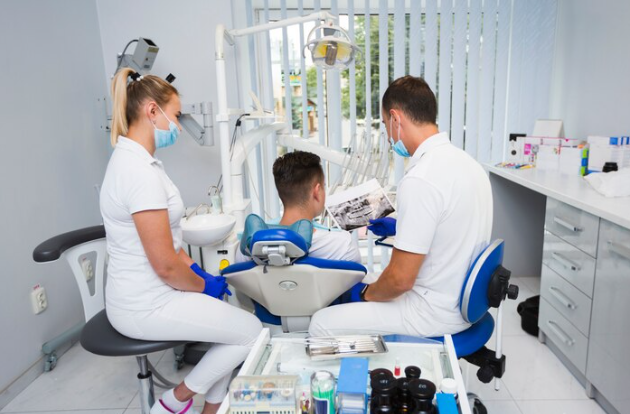Got a damaged or weakened tooth? Dental crowns could be the solution you’ve been looking for. These durable, custom-made caps are designed to restore the strength, shape, and appearance of your teeth.
Whether it’s from decay, an injury, or a large filling, crowns can give your tooth a new lease on life—without anyone knowing the difference.Not only do they look natural, but they’re also tough enough to withstand daily wear and tear, making them a long-lasting option. If you’re ready to protect and restore your smile, dental crowns might be the perfect choice for you!
How do dental crowns restore the function and appearance of damaged teeth?
Dental crowns are highly effective in restoring damaged teeth’ function and appearance. They are custom-made caps that cover the entire tooth, providing essential support and protection. Here’s how dental crowns achieve this:
- Restoring Function: Dental crowns restore the functionality of damaged teeth by reinforcing their structure. Teeth suffering from extensive decay, fractures, or large fillings may lack the strength to handle normal chewing forces. A dental crown encases the tooth, providing a durable outer layer that can withstand the pressure of biting and chewing. This reinforcement helps to preserve the tooth’s integrity and prevents further damage, allowing it to perform its normal functions effectively.
- Enhancing Appearance: Crowns are designed to match your natural teeth’ color, shape, and size. They can be made from diverse materials, such as porcelain, ceramic, or metal-porcelain, to ensure they blend seamlessly with the surrounding teeth. This customization helps improve the tooth’s appearance, making it look as natural as possible. For teeth that are discolored, misshapen, or uneven, crowns improve your smile by providing a uniform, attractive outcome.
- Addressing Structural Issues: Crowns provide structural support for teeth that are severely weakened due to decay or trauma. They cover the entire tooth, including the damaged or weakened areas, thus redistributing the forces of chewing and reducing the risk of further breakdown. This protection is crucial in preventing the tooth from fracturing or deteriorating further.
- Improving Alignment: Crowns can also help improve tooth alignment. If a tooth is misaligned or has been damaged in a way that affects its alignment, a crown can correct the shape and position, contributing to a more balanced and functional bite.
- Long-Term Durability: Modern dental crowns are made from high quality, strong, and durable materials. With proper care, they can last for many years, making them a reliable solution for restoring the function and appearance of damaged teeth.
Dental crowns offer a comprehensive approach to dental restoration, combining strength, functionality, and aesthetics. They ultimately improve oral health and enhance smiles.
What materials are commonly used for durable dental crowns?
Dental crowns are made from various materials, each offering distinct durability, aesthetics, and functionality advantages. Here are the most commonly used materials for durable dental crowns:
- Porcelain: Their clarity and color match actual teeth, making porcelain crowns look natural. They’re great for front teeth, where appearances matter. Although sturdy, porcelain crowns chip more easily than other materials. Zirconia-infused porcelain is stronger and more resilient.
- Ceramic: Ceramic crowns, which look like porcelain crowns, are utilized for front and back teeth. They combine strength and durability with a natural look. Many patients prefer ceramic crowns because they wear less on opposing teeth than metal crowns.
- Metal: Strong and durable metal crowns are fashioned from alloys like gold, platinum, or a combination of base metals. They are ideal for molars, where the crown must endure heavy chewing. Metal crowns last longer. However, their metallic appearance makes them unsuitable for visible teeth.
- Porcelain-Fused-to-Metal (PFM): PFM crowns combine porcelain’s beauty with metal’s durability. The porcelain overlay mimics natural teeth, while the metal foundation is strong. PFM crowns cover the front and back teeth. The metal under the porcelain may cause a black gumline.
- Zirconia: Zirconia crowns are made of durable zirconium dioxide ceramic. Their strength and wear resistance make them ideal for front and back teeth. They are also chip- and crack-resistant and can be tailored to match surrounding teeth. Many dentists appreciate them for their durability.
- Resin: Resin crowns, or composite crowns, are made from plastic. While they are less durable than porcelain or metal crowns, they are more affordable and can be used temporarily while waiting for a more permanent crown. Resin crowns are often used for short-term purposes or when cost is significant.
Choosing the right material for a dental crown based on tooth placement, aesthetic requirements, and the patient’s budget. Your dentist will recommend the finest option, ensuring that the crown meets functional and cosmetic needs.
How long do dental crowns typically last, and what affects their durability?
Dental crowns last 5–15 years, depending on several factors that affect their durability. Here’s a detailed look at how long they last and the key factors influencing their longevity:
- Material: The type of material used for the crown significantly impacts its lifespan. Metal crowns, such as those made from gold or platinum, are known for their exceptional durability and can last over 15 years with proper care. Porcelain-fused-to-metal (PFM) and zirconia crowns also offer strong durability, generally lasting 10 to 15 years. All ceramic or all-porcelain crowns may last around 5 to 10 years, as they are more prone to chipping or cracking than metal options.
- Oral Hygiene: Dental crowns need good oral hygiene to last. Regular brushing, flossing, and dental check-ups help prevent decay around the crown and maintain the health of the surrounding teeth and gums. Dental plaque can result from poor hygiene and decay, compromising the crown and leading to premature failure.
- Dental Care: Routine dental visits are essential for monitoring the condition of crowns. Dentists can identify potential issues early and make adjustments or repairs as needed, extending the crown’s lifespan.
- Bite and Bruxism: Proper bite alignment is important for the longevity of crowns. Misaligned bites or bruxism (teeth grinding) can place excessive pressure on the crowns, leading to wear or damage. In cases of bruxism, a night guard may be recommended to protect the crowns.
- Diet and Habits: Diet and habits also play a role in crown durability. Hard or sticky foods can stress crowns more, potentially causing them to chip or loosen. Habits such as nail-biting or chewing on non-food items can also damage crowns.
- Placement and Fit: The precision of the crown’s fit and the quality of the dental work also affect its longevity. Crowns that are properly fitted and well-placed will perform better and last longer. Poorly fitted crowns may lead to gaps where bacteria can enter, causing decay and affecting the crown’s durability.
By considering these factors and maintaining proper dental care, patients can maximize the lifespan of their dental crowns and ensure long-term satisfaction with their restoration.
What is the process of getting a dental crown, and is it painful?
Getting a dental crown typically involves several steps, and it is generally not painful due to local anesthesia. Here’s an overview of the procedure:
- Initial Consultation: The process begins with a dental consultation, during which your dentist evaluates the condition of your tooth and discusses the best type of crown for your needs. X-rays may also be taken to assess the tooth’s structure and surrounding bone.
- Tooth Preparation: The dentist prepares the tooth for the first appointment to receive the crown. This involves removing any decay or damage and reshaping the tooth to ensure a proper fit for the crown. Local anesthesia is used to numb the area, so you should not feel pain during the procedure. The dentist may also build up the tooth structure if it is severely damaged or weakened.
- Impression and Temporary Crown: Once the tooth is prepared, the dentist takes impressions of the tooth and surrounding teeth using a traditional mold or a digital scanner. A dental lab processes these imprints and a custom crown is crafted. To safeguard the prepared tooth, a temporary crown is applied and maintains its function until the permanent crown is ready.
- Crown Fabrication: The dental laboratory creates the permanent crown based on the impressions. This process usually takes a few weeks. Depending on the type selected, the crown is made from porcelain, ceramic, or metal.
- Fitting and Cementation: During the second appointment, dental professionals remove temporary crowns and examine permanent crown fit and color. Adjustments are made as needed to ensure a proper fit and comfortable bite. Once satisfactory, the crown is cemented onto the prepared tooth using a dental adhesive. The dentist will check the bite and make any final adjustments to ensure the crown functions properly.
- Post-Procedure Care: After the crown is placed, you may experience mild discomfort or sensitivity, but this usually resolves within a few days. Your dentist will provide recommendations for preserving your new crown, including oral hygiene scheduling regular dental check-ups.
Thanks to local anesthesia, getting a crown is straightforward and should be relatively pain-free. Patients experience minimal discomfort during and after the treatment. If you have any concerns or experience persistent pain, it’s important to contact your dentist for further evaluation.
Revitalize Your Smile with Durable Crowns!
At Gentle Touch Family Dentistry, we specialize in revitalizing your smile with durable dental crowns. Whether you’re dealing with a damaged, decayed, or weakened tooth, our high-quality crowns provide a strong and natural-looking solution. Made of high-quality porcelain, ceramic, or metal, our crowns restore your teeth’ function and appearance, ensuring long-lasting results.
Our experienced team takes pride in delivering personalized care, ensuring that each crown fits comfortably and enhances your smile seamlessly. Don’t let dental issues affect your confidence—schedule a consultation with us today to discover how our durable crowns can transform your smile!



